- Home
- Craig Schaefer
Terms of Surrender (The Revanche Cycle Book 3) Page 10
Terms of Surrender (The Revanche Cycle Book 3) Read online
Page 10
Then he found the folded sheaf of parchment. Letters in several hands, distinctive broken wax seals and—in more than one place—the stamp of Minister Zellweger, one of the emperor’s advisors. The letters told a story. Painted a picture.
“Vinz,” Marcello called out, “do you still have friends in the, ah, creative shipping industry?”
“The what now?”
“Smugglers, Vinz. Do you know any reliable smugglers?”
He hobbled over, nodding. “Sure, I can round up a few. What’s the plan?”
Marcello held tight to the papers, gesturing with them as he took in the warehouse. “This. We’re taking it. All of it.”
Vinz’s eyes went wide. “So when you sell it, do I get a cut? I mean, as a finder’s fee sort of thing?”
“We’re not selling it. We’re moving it. I believe we’ve just found Lodovico Marchetti’s weapon of last resort.”
He smiled.
“It would have served him well. It will serve me even better.”
CHAPTER SIXTEEN
A cabin stood in the Verinian wilds, a few days’ travel from Mirenze and close to a riverbank. It was a homey, clean place, with copper pans and strands of garlic cloves dangling over a neat stone hearth. A quiet place.
Quiet, until a hole in the world ripped open and bared the howling void beyond.
Nessa leaped through the hole with a wild, delighted cackle, yanking Mari by the wrist. Behind them echoed the crackling of flames, shouts of rage, screams of agony, until the tear in the world whipped shut and vanished at their backs.
The women leaned against each other, panting for breath. “Wait,” Mari gasped, “the others—”
“Have their own escape routes.” Nessa was already on the move, sheathing the Cutting Knife and rummaging through cupboards. “There’s a knapsack at the foot of the bed; bring it here. Quickly now. Nobody should know this place, but there’s no guarantee. We need to move.”
“Where are we?”
“My home,” Nessa said. “Congratulations, you’re the first guest I’ve ever had. I’d put on a kettle of tea, but, again, time is an issue.”
“Even Despina and Vassili haven’t been here?”
Mari rushed over, holding open the empty pack as Nessa filled it. She tossed in rolls of linen, tiny bundles wrapped in butcher paper, sachets, and herb-stained pouches with the scent of dried spices.
“A witch,” Nessa said, “values her privacy.”
“So what do we do now?”
Nessa’s sapphire eyes gleamed behind her glasses, narrowing in concentration.
“Now we murder the Dire,” she said, “which won’t be easy. She’s old. Centuries old. And she always did hoard the best tricks for herself. Once that’s done and the last of her followers are put to the knife, we can rebuild the coven. And do it properly this time.”
They stepped out onto a wooded path, the winding trail leading down to the river’s edge. Bright sunlight filtered through the trees, and a blanket of scarlet and gold leaves crunched under their feet.
“How will we do it?” Mari asked.
“With help. I need advice from my teacher.”
“Your teacher? Was she at the coven glade?”
Nessa shook her head. “No, she died many years ago. A few of my kind, though, true witches, worthy of the name…they linger.”
An hour’s walk upstream along the fast-moving river, and Mari saw the hills rising in the distance. Tall, rocky, and green as emeralds. A distant hissing sound slowly grew to a deafening tumult as a majestic waterfall loomed into view. Water coursed down from the cliff top to feed the river below, roaring with the voice of a great bear, splashing in a thick curtain against the polished rocks.
And beyond that curtain, inky blackness. A cave behind the waterfall.
Standing on the bank, Mari felt pinpricks of icy cold spatter her face and arms, a kiss from the curtain of mist that swirled on the open air. Her tongue brushed her lips and tasted cool, fresh water.
“Stay here,” Nessa told her, “and stand watch. If you see anyone, kill them for me. I’ll be right back.”
* * *
Nessa eased her way along a thin outcropping of rock, the stone slick and treacherous under her feet. The roar of the water drowned out the world and left her dress icy damp in the spray. She cupped protective fingers over her glasses and felt her way with the other hand, slipping into the cave beyond the waterfall.
A shaft of sunlight streamed from a jagged crack in the cave’s ceiling. Stalactites aimed downward like stone spears, and fuzzy green moss clung to the walls. A peaty, muddy smell hung in the air.
In the heart of the cave, just a few feet left of the splash of sunlight, a shrine awaited. Human bones had been nailed to rough wooden boards with thin black iron nails: a skull, half a rib cage, a fractured pelvis, even individual finger bones, like some demented mortician’s anatomy exhibit. At the foot of the grisly totem stood a polished slab of granite, chiseled with savage sigils, all turned the color of rust from the ghosts of old bloodstains.
Nessa stripped off her dress, letting it pool around her feet. Then she stepped forth and knelt before the altar stone.
A ceramic pot painted in bands of brown and scarlet sat beside the stone. She picked it up and raised the lid. The cream inside was ice white and flecked with remnants of finely chopped herbs in a poisonous rainbow of colors. Deadly nightshade, henbane, sniperoot, and hemlock. Nessa scooped up a dollop of the ointment in her curled fingers. She smeared it across her neck and the curve of her bare shoulders, fingers trailing across the swell of her breasts and down to the small of her stomach, rubbing the salve in. Her skin tingled, then burned, and by the time she’d reached her ankles it felt like the cave was slowly spinning around her. Her nostrils stung when she inhaled, with a smell like strong spearmint.
She sat, cross-legged with her upturned hands on her knees, and closed her eyes. Breathing slowly, letting her consciousness slip and subside, drifting toward the world between worlds.
“Well,” said a woman’s voice, “look who comes to grace me with her presence after all this time.”
Nessa’s eyes flicked open. A gray-haired woman in a ragged dress crouched beside her, her face concealed behind a bone mask fashioned to resemble a muskrat. She was no ethereal specter. She didn’t glow or float; she was simply there, when she hadn’t been a moment before.
“I built my cabin here, so I could be closer to you,” Nessa said flatly.
“You could have moved into the cave.” Muskrat waved her hands, taking in the space. “Plenty of room.”
“Nothing’s ever good enough for you, is it, Mother?”
“The words good enough betray shockingly low standards. I taught you that. Now come, tell me what you’ve been up to.”
Nessa shrugged. “Started an insurrection. Now I have to kill the Dire. Was hoping you could help.”
“Kill Gertie?” Muskrat clasped her hands together. “Oh, darling, you’re supposed to kill the old Dire and then take over. Now she knows you’re coming. Makes the job so much harder.”
“Yes, well,” Nessa replied, “it was a heat-of-the-moment sort of decision.”
“These things happen. So who’s that lingering outside my cave? She seems interesting, if a bit raggedy. New apprentice?”
“Coven knight.”
Behind her mask, Muskrat’s pale blue eyes widened.
“Really? That old tradition?”
“I’m bringing back all of the old traditions,” Nessa said, her voice firm. “This coven has become an embarrassing farce, a shade of its old glory. We’re going to get it right this time. And I will lead the way to Wisdom’s Grave.”
Muskrat shrugged. “You’d be the first. Well, more power to you. Hmm. You know, we stopped using coven knights because so few of us could admit we might need some protection beyond our own magic and guile. Is that a bit of uncharacteristic humility I detect?”
“She’s mine, and I can do with her as I like. T
hat pleases me.”
Nessa could hear the teasing smile in Muskrat’s voice as she leaned closer.
“Really? Is that the only reason you chose her? There’s no other motivation involved? You’re certain?”
Nessa folded her arms and glowered. “Mother.”
“Fine, fine.” Muskrat waved an idle hand. “Well, I hope she’s good at fighting, seeing as you just picked a battle with that old monster. I think there’s really only one chance at taking Gertie down. You need the Misery.”
Nessa stared at her.
“The Misery,” she said. “Which kills anyone who touches it.”
“Not necessarily.”
“It killed you.”
“Details, details.” Muskrat shook her head. “Honestly, dear, I’d think you’d be champing at the bit to prove you’ve exceeded my skill.”
“Normally? Yes. But I am neither reckless nor suicidal.”
“Given that you just declared war against our own coven, I question that statement. Old Gertie has forgotten more about the craft than you’ll ever learn. The only way you’ll survive a confrontation is with the Misery in hand. It’s not all bad news. I do understand how it killed me. I’ve certainly had plenty of time to think about it. I believe I can help.”
“Good.” Nessa sighed. “Thank you.”
“Though it may not matter in the end.”
“Hmm? What do you mean by that?”
Muskrat stood. She paced the stone floor on bare and silent feet, her tattered dress swaying around her ankles.
“Abandoning one’s mortal flesh is remarkably liberating. I’ve drifted from my tether. Seen things you wouldn’t believe. And…I’ve become a bit of a prophet in my later years.”
“Are you going to tell my fortune?”
“In a way.” She stopped pacing. “And I wish I didn’t have to. But it wouldn’t be fair not to give due warning. I’d hoped I was wrong, but when you said that girl standing outside the waterfall was your knight, not your apprentice…I knew.”
“What?” Nessa frowned. “What is it?”
“Do you ever get the feeling you’ve been here before? That everything happening has happened?”
Nessa shrugged. “Everyone does, now and again. A trick of the mind.”
“Will you open your thoughts to me? Telling’s not enough. I need you to see as I see.”
“See what, Mother?”
Muskrat’s voice was suddenly grave.
“Your doom.”
Nessa’s skin still burned from the herbal ointment, but that didn’t stop an icy chill from rippling down her spine.
“Show me,” she said.
Muskrat glided over to her on silent feet, leaned in, and clasped her fingertips to the sides of Nessa’s forehead.
“Fall into me,” Muskrat whispered, “and witness.”
* * *
Nessa fell, tumbling from her skin and bones into a whitewashed, silent void. The universe turned into a silver-white blur and then burst into fire.
So much sound, overwhelming her. Crackling flames, a cheering crowd, an unfamiliar man’s voice shouting over the din.
“Don’t do this! She’s lying to you!”
Nessa’s vision was a spinning, nauseating blur, like she’d slipped into the body of a drunken hornet. Flitting this way and that, only giving her split-second glimpses in its maddened dance. A funeral pyre—no, not a funeral. An execution. A wooden stake, iron manacles, a pile of kindling feeding a growing flame. Muddy, jeering faces in the crowd. A pale arm splayed on the smoky wood.
And Mari, dressed in strange and ill-fitting armor and drenched in enough blood to fill ten men’s bodies. Seething, her fury birthing a maddened shriek as she swung the rapier in her hand.
The hornet’s eye spun. Sunlight glinting on steel. Screams of pain, of fear, frenzied shouting and the clash of blades.
Then a meaty thud, and silence.
The hornet shot up into the sky, then turned its gaze downward.
Mari’s ragged corpse lay next to Nessa’s own, her head in the crook of Nessa’s lifeless arm. Then the flames spread and took them both.
* * *
Nessa slammed back into her own body, taking a long and shuddering breath as if she’d been held underwater.
“Do you see?” Muskrat asked, her eyes holding a rare mingling of sorrow and gentleness.
“You call yourself a prophet,” Nessa gasped, catching her breath, “but do you speak of things that might be or must be? Tell me the truth!”
“Neither. Worse. What you saw was your past.”
“That makes no sense. Stop speaking in riddles.”
“In an age gone by, an age older than sun and moon, a story was told. A special story. And it left a scar upon the wheel of worlds. Part of that scar is shaped like you. You and your knight. This has all happened before, and it will all happen again.”
Nessa pressed the heel of her hand to her forehead, groaning. “Stop it, stop it, stop it. This cryptic nonsense was infuriating when you were alive, Mother, and death hasn’t made it any more amusing. If doom is on my heels, help me to defeat it! Otherwise, what good are you?”
Muskrat shook her head. “There are…limitations upon me. I can’t speak of all I’ve seen. All I can do is offer this warning. That, and a word of advice.”
“I’m listening.”
“Train your successor,” Muskrat told her. “Perhaps you’ll have the cunning to give death itself the slip, but if you love our craft—and I know that you do, it’s the only thing you ever did love—train a successor. Just in case.”
“And the Misery?”
Muskrat languidly gestured to the shrine of bones.
“Take me with you. We’ll sort it out on the way.”
* * *
Mari jumped to her feet and hoisted Nessa’s pack on one shoulder, catching the glimmer of movement behind the roaring curtain of water. It was Nessa, her dress damp and hair matted, blinking behind droplet-spattered glasses. Mari’s gaze dropped to the yellowed skull in her hand.
“I’ll explain on the road,” Nessa said before she could get a word out and gestured for her to open the pack. “It’s a long journey, no time to lose.”
“The road? Can’t we just use your knife to get there?”
Nessa stored Muskrat’s skull safely, nestled between soft herb pouches, and closed the flap.
“A Cutting Knife has to be carefully taught how to open a door, and mine only goes two places: the coven glade, and my cabin. I’m afraid we have to do this the hard way.”
“Where are we going?”
“North,” Nessa said. “We’re going to Winter’s Reach.”
CHAPTER SEVENTEEN
In his chambers in Rhothmere Keep, the beating heart of the Murgardt Empire, General Baum stared down at the growing pile of dispatches in disbelief.
It was all falling apart. It had, he supposed, been falling apart for quite some time. The decay had been slow and subtle, like termites in the walls. Digging, chewing, undermining a house long before the first outward signs of disaster.
Now, though, the signs of collapse were more like a shooting star. Burning on a hard trajectory downward.
Another keep lost in Belle Terre. Another village gone dark. Another team of runners who never made it to the border, their messages lost or fallen into the hands of rebels. The Terrai had taken full advantage of the troop drawdown, massing and striking hard at the occupation’s weakest points, and popular support was on the rise. Every victory earned them more soldiers for the cause. The rebels hit hard, attacking and fading faster than the Imperial troops could keep up with.
Of course they can, he thought. It’s their land. They know it better than we ever could.
It still didn’t make sense. The Terrai had been more than beaten: they’d been crushed. Starved into subjugation and stripped of their weapons, their heathen idols, even their native tongue—a program some of the emperor’s advisors hoped would fully turn them into proper Imperial
citizens in three or four generations. Baum thought that was pure idiocy. “Civilizing” the Terrai was cruel vengeance masked as compassion, but he wasn’t paid to make those decisions.
The fact remained that the natives couldn’t forge anything more dangerous than a horseshoe nail in Belle Terre without getting the noose. So how the hell were bands of malnourished rebels taking on Imperial fortifications and winning?
That was the first pile of dispatches, on the left of his broad and cluttered desk. The second, on the right, kept him abreast of the ongoing disaster that was Theodosius the Lesser’s grand crusade. The reckless dream of equaling his father’s glory. All he’d managed to do, so far, was equal his father’s love of spending money. Half the peasant levies were bogged down somewhere in Carcanna on their way to the desert. Barely any of the professional military support they’d hoped to receive from the Empire’s client states had materialized, and the Bank of the Rhone was hammering on the keep’s front door demanding to know where their gold was. The first war against the Terrai had already stretched the Empire’s resources to the breaking point. Keeping the crusade afloat was like squeezing blood from an already wrung-out stone.
Baum sat quietly at his desk for a very long time. He knew what he needed to do. It just took him time to find the resolve, then to force himself to his feet, straighten his shoulders, and march to the council chamber. Baum had been a man of war since he was blooded at twelve years old. He couldn’t remember the last time he’d been afraid of anything.
He was afraid now.
Shouting rose from behind the chamber door. Baum strode in, casting a dour glance as the emperor’s ministers debated and waved papers at one another, sitting around the great circular table. And above their heads, suspended by mighty chains from the vaulted ceiling, the Sand Clock: the mechanical marvel of gears and glass, Theodosius the Greater’s fondest prize from his own crusade.

 Right to the Kill (Harmony Black Book 5)
Right to the Kill (Harmony Black Book 5)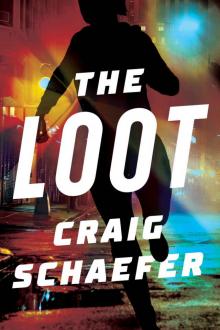 The Loot (Charlie McCabe Thriller)
The Loot (Charlie McCabe Thriller) Detonation Boulevard
Detonation Boulevard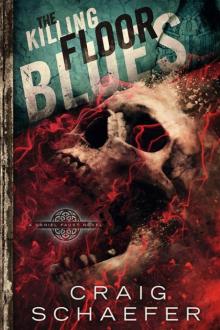 The Killing Floor Blues (Daniel Faust Book 5)
The Killing Floor Blues (Daniel Faust Book 5) Daniel Faust 03 - The Living End
Daniel Faust 03 - The Living End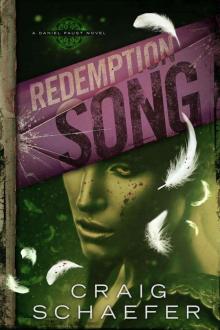 Redemption Song (Daniel Faust)
Redemption Song (Daniel Faust) Harmony Black (Harmony Black Series Book 1)
Harmony Black (Harmony Black Series Book 1) Wisdom's Grave 01 - Sworn to the Night
Wisdom's Grave 01 - Sworn to the Night Cold Spectrum
Cold Spectrum Bring the Fire (The Wisdom's Grave Trilogy Book 3)
Bring the Fire (The Wisdom's Grave Trilogy Book 3)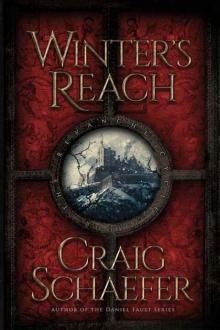 Winter's Reach (The Revanche Cycle Book 1)
Winter's Reach (The Revanche Cycle Book 1)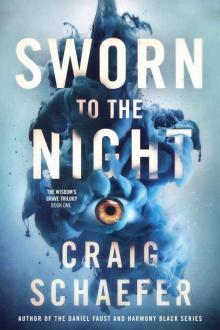 Sworn to the Night (The Wisdom's Grave Trilogy Book 1)
Sworn to the Night (The Wisdom's Grave Trilogy Book 1)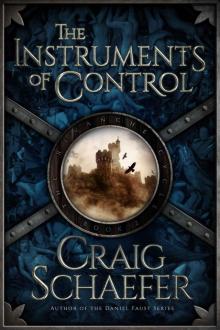 The Instruments of Control (The Revanche Cycle Book 2)
The Instruments of Control (The Revanche Cycle Book 2)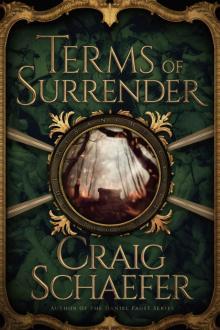 Terms of Surrender (The Revanche Cycle Book 3)
Terms of Surrender (The Revanche Cycle Book 3)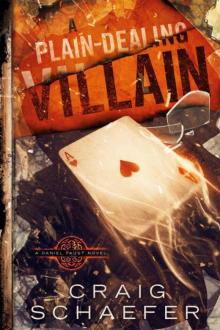 A Plain-Dealing Villain
A Plain-Dealing Villain Detonation Boulevard (The Wisdom's Grave Trilogy Book 2)
Detonation Boulevard (The Wisdom's Grave Trilogy Book 2)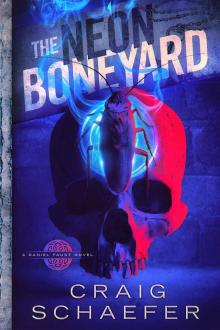 The Neon Boneyard
The Neon Boneyard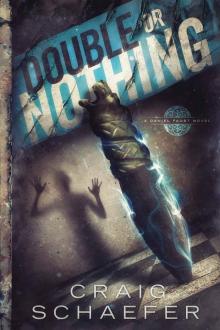 Double or Nothing (Daniel Faust Book 7)
Double or Nothing (Daniel Faust Book 7) The White Gold Score (A Daniel Faust Novella)
The White Gold Score (A Daniel Faust Novella)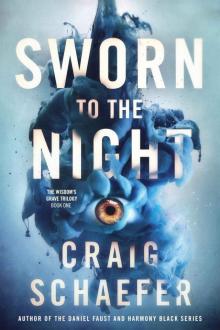 Sworn to the Night
Sworn to the Night